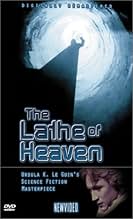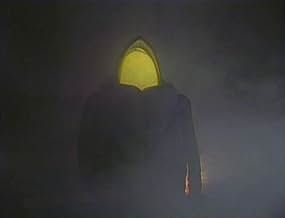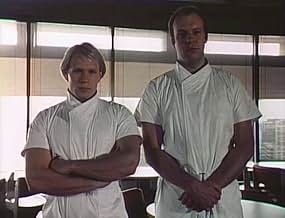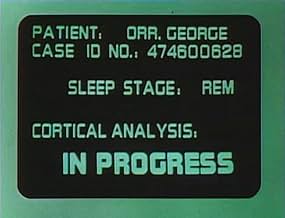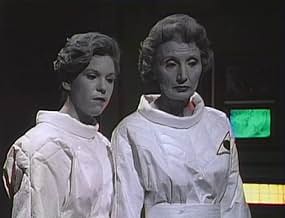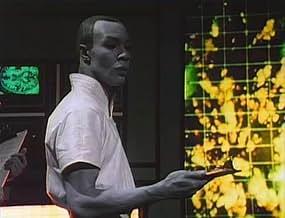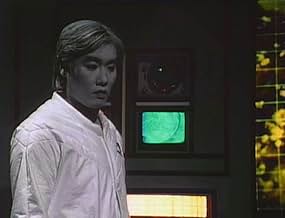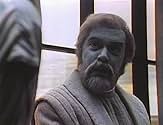The Lathe of Heaven
- TV Movie
- 1980
- 1h 45m
IMDb RATING
7.1/10
2.9K
YOUR RATING
In a highly controlled and overpopulated society, a man who has terrifying dreams that affect reality is assigned a psychiatrist who takes advantage of the situation.In a highly controlled and overpopulated society, a man who has terrifying dreams that affect reality is assigned a psychiatrist who takes advantage of the situation.In a highly controlled and overpopulated society, a man who has terrifying dreams that affect reality is assigned a psychiatrist who takes advantage of the situation.
- Directors
- Writers
- Stars
- Awards
- 1 nomination total
Peyton E. Park
- Mannie Ahrens
- (as Peyton Park)
James Bodean
- Guard
- (uncredited)
John Rainone
- The Grey Person
- (uncredited)
Ben Stephenson
- Scientist
- (uncredited)
- Directors
- Writers
- All cast & crew
- Production, box office & more at IMDbPro
Featured reviews
Last night I got a chance to see one of my favorite SF movies, and it only took 20 years.
Back in 1978, I was working at a mom-and-pop bookstore in Dallas called Taylors. One day one of the customers bought a book by Ursula K. LeGuin: "The Lathe of Heaven". I told her that she was one of my favorite authors, and that I loved the book. She said that she was involved in the production of a film of the book that was to be done locally.
Early in 1980 it was aired. Bruce Davison (recently the Senator in "X-men") played the protagonist, George Orr. And various Metroplex locations stood in for Portland in the near-future year of 2002. City Hall (later the OCP HQ in "Robocop"), Reunion Arena and the Water Gardens in FW (previously used in "Logan's Run").
George Orr has a problem: dreams. He doesn't want to have any. He takes drugs to try and thwart his unconscious so that he can sleep but not dream. Because if he does dream a special kind of dream, an "effective" dream, it changes reality "all the way back to the Stone Age".
Dr. William Haber is an oneirologist: a dream specialist. He doesn't believe George's story, of course. He thinks that George is sick, not cursed. He eventually comes around to the realization that George is right. A power struggle ensues to decide who will be in charge of deciding who gets to make the decisions of how to use this power.
The story touches on race relations, psychology, Taoism and more. And all on a miniscule budget of 250K.
An added bonus was the addition of interviews with Bruce Davison and Ms. LeGuin, the latter with Bill Moyers. She rarely does interviews, and it was wonderful hearing her add little behind-the-scenes details and commenting on the story and film. Since my understanding of Taoism is limited to readings of "The Tao of Pooh", I didn't realize the use of Taoism until I heard UKL mention it.
If I had had 90 bucks to blow on a KERA membership, I could have gotten the video from them. In fact, the on-air weasel said that the tape was "only available through public TV". If you check amazon.com, as I did last night, you will find that this is a bald-faced lie: TLoH will be released on VHS and DVD later this month, with the interviews and all.
The only thing that burned my butt about the film that I saw last night was the one change they made. Originally, they used Ringo Starr's version of the Beatles tune "A Little Help from My Friends". The new version has a different cover version. One of the reviews on amazon.com stated that this was because it would cost too much to get the rights from Michael Jackson, who now owns the entire Beatle catalog. This doesn't work. IMHO, MJ would get money no matter who did it.
Uncle Steve says check it out.
Back in 1978, I was working at a mom-and-pop bookstore in Dallas called Taylors. One day one of the customers bought a book by Ursula K. LeGuin: "The Lathe of Heaven". I told her that she was one of my favorite authors, and that I loved the book. She said that she was involved in the production of a film of the book that was to be done locally.
Early in 1980 it was aired. Bruce Davison (recently the Senator in "X-men") played the protagonist, George Orr. And various Metroplex locations stood in for Portland in the near-future year of 2002. City Hall (later the OCP HQ in "Robocop"), Reunion Arena and the Water Gardens in FW (previously used in "Logan's Run").
George Orr has a problem: dreams. He doesn't want to have any. He takes drugs to try and thwart his unconscious so that he can sleep but not dream. Because if he does dream a special kind of dream, an "effective" dream, it changes reality "all the way back to the Stone Age".
Dr. William Haber is an oneirologist: a dream specialist. He doesn't believe George's story, of course. He thinks that George is sick, not cursed. He eventually comes around to the realization that George is right. A power struggle ensues to decide who will be in charge of deciding who gets to make the decisions of how to use this power.
The story touches on race relations, psychology, Taoism and more. And all on a miniscule budget of 250K.
An added bonus was the addition of interviews with Bruce Davison and Ms. LeGuin, the latter with Bill Moyers. She rarely does interviews, and it was wonderful hearing her add little behind-the-scenes details and commenting on the story and film. Since my understanding of Taoism is limited to readings of "The Tao of Pooh", I didn't realize the use of Taoism until I heard UKL mention it.
If I had had 90 bucks to blow on a KERA membership, I could have gotten the video from them. In fact, the on-air weasel said that the tape was "only available through public TV". If you check amazon.com, as I did last night, you will find that this is a bald-faced lie: TLoH will be released on VHS and DVD later this month, with the interviews and all.
The only thing that burned my butt about the film that I saw last night was the one change they made. Originally, they used Ringo Starr's version of the Beatles tune "A Little Help from My Friends". The new version has a different cover version. One of the reviews on amazon.com stated that this was because it would cost too much to get the rights from Michael Jackson, who now owns the entire Beatle catalog. This doesn't work. IMHO, MJ would get money no matter who did it.
Uncle Steve says check it out.
I found this during late-night channel surfing. I thoroughly enjoyed it. The effects were sometimes cheesy but often cool. The direction was creative and quite effective in bringing Ursula K. LeGuin's classic story to life. But BE WARNED: this is a WEIRD MOVIE. You have to be wanting a weird movie in order to really enjoy it. It takes quite a bit of thought to really follow the plot if you haven't read the book, but it's worth watching several times. It is not an action flick (there is very little action, and some people find it boring, possibly with good reason) but it brings up all kinds of interesting ideas and possibilities that sent my mind racing. Every situation is presented in a way that makes you really look at it and ponder it. And the emotional aspect is powerful at times and made me smile more than once. The camerawork, acting, and electronic background music are artistic and place the viewer in another world, one which I personally found beautiful, exciting, and awe-inspiring. If you like artsy, strange, contemplative film, you might want to check this out.
To those who came to this one expecting the A&E remake, don't worry. You've come to the right place. Although the A&E version has all the glitz and glamor, this 1980 PBS production has all the rest (which the A&E is sadly missing).
1. It is fairly loyal to the material, Ursula K. Le Guin's novel.
2. It is well acted, arguably very well acted.
3. Characterization is loyal to that in the novel.
4. It communicates the somewhat convoluted plot quite effectively.
5. It carries the message forward. (No spoilers here.)
(The A&E remake accomplishes *none* of these.)
So snag this one on DVD while it's still available. Watch it. It's a little treasure. Although the glitz and glamor of the A&E remake are missing, it has everything else.
"Antwerp"
1. It is fairly loyal to the material, Ursula K. Le Guin's novel.
2. It is well acted, arguably very well acted.
3. Characterization is loyal to that in the novel.
4. It communicates the somewhat convoluted plot quite effectively.
5. It carries the message forward. (No spoilers here.)
(The A&E remake accomplishes *none* of these.)
So snag this one on DVD while it's still available. Watch it. It's a little treasure. Although the glitz and glamor of the A&E remake are missing, it has everything else.
"Antwerp"
I had public television on several days ago (March 10, 2001) and "Lathe of Heaven" was starting on their series "Movies Worth Taping". I'm glad I happened to turn the TV on, as it was a movie well worth watching! It was made in 1987 as the first made-for-public-TV film, and is based on a novel by Ursula Le Guin.
This movie explores the notion of "effective dreaming", where one's dreams actually come true. It explores the strange dreams of George Orr (Bruce Davison). When he has these dreams, he wakes to find that his dreamt-up situations are now not only reality, but other people suddenly have adapted as if this reality has been with the world for some time.
George is traumatized by these dreams, and seeks the help of Dr. William Haber (Kevin Conway). Dr. Haber's intentions are good, to harness the power of these effective dreams to the betterment of the world, but he clearly abuses the doctor-patient relationship and hypnotizes George to have specific kinds of dreams. One motto of this film might be "be careful what you dream about"!
I found the special effects sometimes interesting, but often heavy-handed and not so smoothly executed. The setting, sometime in the near future in Portland, Oregon, was inexplicably dreary, beyond the rain that the city is well known for. The character development could have been stronger, with ancillary characters like Dr. Haber's secretary and the very few others seeming to be made out of cardboard and lacking emotion. George and Heather LeLache (Margaret Avery), however, enjoyed more solid and believable depictions.
In spite of these criticisms, the film was an exciting journey into inner space that indulges us to think about deep philosophical questions. What is reality? Are there parallel realities? What is or should be knowable about the nature of existence (to me reminiscent a bit of "2010", one of my favorite science fiction films)? What happens if we dream each other into or out of reality? "The greatest good for the greatest number" or rights of the individual? Can we design a utopia or will we be doomed to experience accidents we never considered that render such a proposed utopia much less than ideal? "The Lathe of Heaven" doesn't have the fresh and exciting visual effects of earlier science fiction films like "2001" or later ones, but is an interesting film that is a must see for science fiction fans.
This movie explores the notion of "effective dreaming", where one's dreams actually come true. It explores the strange dreams of George Orr (Bruce Davison). When he has these dreams, he wakes to find that his dreamt-up situations are now not only reality, but other people suddenly have adapted as if this reality has been with the world for some time.
George is traumatized by these dreams, and seeks the help of Dr. William Haber (Kevin Conway). Dr. Haber's intentions are good, to harness the power of these effective dreams to the betterment of the world, but he clearly abuses the doctor-patient relationship and hypnotizes George to have specific kinds of dreams. One motto of this film might be "be careful what you dream about"!
I found the special effects sometimes interesting, but often heavy-handed and not so smoothly executed. The setting, sometime in the near future in Portland, Oregon, was inexplicably dreary, beyond the rain that the city is well known for. The character development could have been stronger, with ancillary characters like Dr. Haber's secretary and the very few others seeming to be made out of cardboard and lacking emotion. George and Heather LeLache (Margaret Avery), however, enjoyed more solid and believable depictions.
In spite of these criticisms, the film was an exciting journey into inner space that indulges us to think about deep philosophical questions. What is reality? Are there parallel realities? What is or should be knowable about the nature of existence (to me reminiscent a bit of "2010", one of my favorite science fiction films)? What happens if we dream each other into or out of reality? "The greatest good for the greatest number" or rights of the individual? Can we design a utopia or will we be doomed to experience accidents we never considered that render such a proposed utopia much less than ideal? "The Lathe of Heaven" doesn't have the fresh and exciting visual effects of earlier science fiction films like "2001" or later ones, but is an interesting film that is a must see for science fiction fans.
I thought this was one of the best science fiction movies of all time. I thought the story was thoughtful, inventive and very, very interesting. I have since thought that this might be some sort of collective unconscience view of how the world is created and maintained by God and that mankind being a part of God is aware of this concept. (Or maybe I'm just reading too much into the movie.) In any case, I would very much like to see this movie come out on video tape so that I might buy a copy. I've got my fingers crossed. My review of the movie is "WAY TO GO!!"
Did you know
- TriviaThe night that this was first broadcast, there was a major power outage in the Pacific Northwest, which meant that author Ursula K. Le Guin was unable to watch the film based on her own book on its first run.
- GoofsOn the government water distribution tanker truck, the word "mobile" is misspelled "MOBIL". Although, since this takes place in the future, it's possible the spelling has changed.
- ConnectionsFeatured in No Sleep TV3: Classic Episode #1: "Our All-Time Faves" (2015)
Details
- Release date
- Countries of origin
- Official site
- Language
- Also known as
- La rueda celeste
- Filming locations
- Production companies
- See more company credits at IMDbPro
Contribute to this page
Suggest an edit or add missing content

